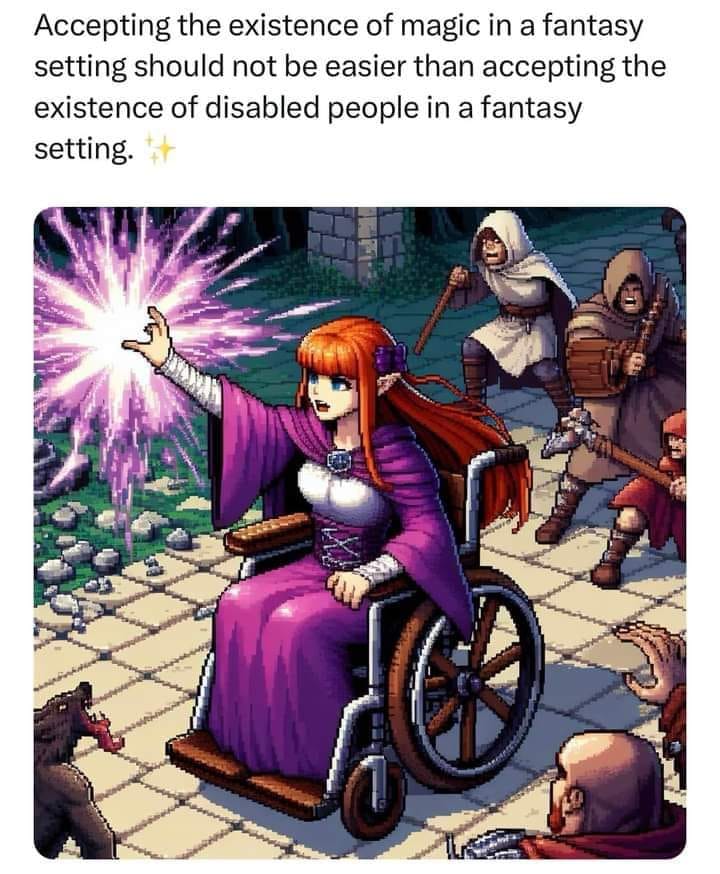this post was submitted on 10 Dec 2023
1156 points (94.4% liked)
RPGMemes
12558 readers
92 users here now
Humor, jokes, memes about TTRPGs
founded 2 years ago
MODERATORS
you are viewing a single comment's thread
view the rest of the comments
view the rest of the comments

I mean that really depends on the world you are set in: if magic is everywhere/can heal anything someone who is blind could break immersion IF there is no good reason (he doesn't want to see for personal reasons, it's a curse and can't be removed etc.)
However if magic treatment is rare/expensive of course there would be lots of disabled people (monster attacks, accidents, diseases, etc.)
Obviously thats not the problem here(the guys just a dick) but it's something i run into a lot when designing worlds/characters: a lot of our real world problems fall apart if introduced into a magical setting.
it could lead to really cool story/character stuff though like jjk: people born with broken bodies but incredible magical powers
Never miss an opportunity for unique challenges/stories.
It could be a hook like fullmetal alchemist or a realization for characters later: they are fine the way they are they don't need to be fixed kind of stuff. simply discounting disabilities takes so much potential out of worlds/stories.
If I were a DM, I'd consider magic to be another human sense. It can't fix the body more than the body existed before injury, and still doesn't fix all injuries. So like a blind monk that trains can extend magic to act like an echolocation, but they were born blind so can't be unblinded. Or someone broke their back and it healed incorrectly causing paralysis, only highly specialized magic has a chance of fixing it.
Which is actually how it works in the real world too!
Except it's called medicine instead of magic. Trolololol.
Doctors have specialisations, some are very very specialised: e.g. specific types of neurosurgeon.
Also, accidents happen. Sometimes the doctor/magic-user gets it catastrophically wrong.
You're overstating how common magic is. Aragorn is only 5th level, and you need to be a 13th level bard/cleric/druid to regrow limbs. Even then, you can only regrow one or two per day. It can be done, but it's not common.
Is that enough to feed the party?
As always, the real issues are being discussed in the comments.
Create food and water is a 3rd level spell. Use your spell slots wisely.
To be fair, Aragorn was also in a low-magic setting barely comparable to baseline D&D. Magic is extremely common in D&D these days. The modern guidelines are something like, 20% of a population are more than commoners, martials are twice as common as partial casters, partial casters are twice as common as full casters, and there's half as many people at each level as there were at the level before it. The math works out to be something like 6% of the population being fullcasters of various types. Out of 100,000 people, a large but plausible size for a medieval city, 3,000 of them have 1st-level spells, 750 have 2nd level spells, 186 have 3rd level spells, 48 have 4th level spells, and even 12 have 5th level spells... A far cry from LotR's "there are five wizards in the world". A 13th-level spellcaster is something like 1-in-200,000, rather rare but not unfathomably so.
Another possibility is that maybe magic can only heal injuries and illnesses, but can't do anything with congenital disabilities, because the magic restores the person to their natural state, and being blind/etc is what's natural for that character. So even if magic could heal those who are disabled due to circumstances, there would still be plenty of disabled people who were born with their disabilities.
But... There's a spell called remove blindness in several dnd editions. It's not even high level.
I'd say that if there's a spell that literally states a fix, it's fixable. There might be some that do not though.
Maybe the spell only removes acquired forms of blindness, say through the magic spell Blindness, curses, etc, and has no ability to generate new, functioning tissue for someone that never had any.
Pathfinder 1e / dnd 3.5 : https://www.d20srd.org/srd/spells/removeBlindnessDeafness.htm
5e spell: https://www.dndbeyond.com/spells/lesser-restoration
5e's spell might be interpreted as in, it removes the "blinded" condition, which might be different than being "blind". However I would guess that when they developed the spell they did not think about it, they just bundled a bunch of spells in 1.
Yeah, I would agree that they probably didn't even think about it. I'd probably interpret the spell as removing the "blinded" condition, whether it's caused by magic or just someone throwing sand in the character's eyes or other "normal" causes of the blinded condition.
The Pathfinder version also specifies "The spell does not restore ears or eyes that have been lost, but it repairs them if they are damaged." Someone with congenital blindness or deafness may not have "damage" that can be repaired, and with the ears/eyes being naturally non-functional, the spell giving them a new ability (sight/hearing) that they previously didn't possess could be interpreted as being beyond the spell's scope.
In most magic systems (RPG and books/films) using magic costs the magic user something (decades of studying, exhaustion, life force, mana potions/crystals, ...). So it would be natural that they want to be compensated for their work.
So depending on how difficult regrowing an eye is for the magic user that could be quite pricey.
Some magic systems also require the magic user to exactly picture what they want to cast. Not sure if anyone can actually picture all the connections of an optical nerve.